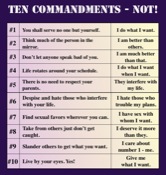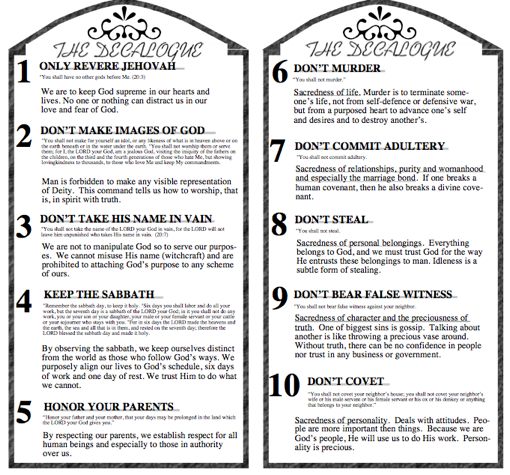B) Our Loving Standard - The Ten Commandments (Deuteronomy 5:6-21)Most of us have wrongly memorized the ten commandments. We usually have just memorized the ten commandments rather than the whole covenant. The difference is not long, just the introduction, but because of this lapse, we gain a wrong perspective of these ten commandments. Let’s look closely at this introduction which is found both in Deuteronomy 5:6 and Exodus 20:2.
It truly is an introduction. A person might say, “Let me introduce myself, I am ….” God does the same. This was the custom of the person offering the covenant. These covenants were common at that time in the world and were never given by those of equal status. It was always the greater offering the covenant to the lesser, usually the one who lost the battle. The Lord God, as He introduced Himself, has formed a special relationship with this group. Lord is not a title but His name, Yahweh. The English translations are horrible because they refuse to translate His Name. Jehovah and Yahweh are the same name. The great fathers, Abraham, Isaac and Jacob and Joseph, were not under this yet established covenant with God. God had spoken to them but on a different level. They would also like Abraham be saved by faith. These Israelites all were delivered by God. The Hebrew actually has three ‘out of’ prepositions for emphasis: out of the land, out of Egypt, out of slavery. God rescued them and were now obligated to Him for His deliverance. You might say that is unfair, but do remember when it was that God saved them. It was after they cried out to the Lord for help that He came and rescued them. They did ask for His help. Modern man does not believe he is a slave to anyone. Each is his own god ready to fight any other god that opposes his free will. Repentance is not popular. The Western world turns away from God because those dominated by the culture no longer know they are slaves. Man should wake up and realize that man cannot simply live peaceably with others. This is the reason there are so many wars and fights and arguments. There is a conflict of will.Man seeks his own will even at the demise of the other. We see it in Joseph’s brothers and we see it in our own families. Someone was just sharing, “Why is it that our families have to bicker over such a host of little things?” Man is chained to his lusts. In the end it becomes a power struggle. The most powerful, wealthy and perhaps clever (not always meant in a good way) become the ruler. True freedom and democracy have grown up under the protection of Christian values. By fearing God, man rightly treats his neighbor. People keep the laws. Otherwise man needs to be herded by power and manipulation. Western governments increasingly step towards returning to authoritative governments. The foundation of democracy is eroding as man insists on living apart from the direction of their Creator and Savior. The Israelites became slaves to the Egyptians at a certain point. It is the same with us. Man was originally made to serve God. He rejected this service for the supposed freedom of another master. Mankind had obligation to serve God. God would wonderfully provide for man, but man was expected to obey God. When man disobeyed God, who did he choose to obey? It was the evil one. Man transfered his allegiance to the serpent which was Satan himself. Jesus sums this up in John 8:31-36.
You a slave. I a slave. We both have committed sin and revealed our loyalty, if not present because of the Lord’s grace, then certainly in the past. “And you were dead in your trespasses and sins” (Ephesians 2:1). Application Who do you serve? Yahweh the Creator or the devil? Who do you think is a better Master? God is gracious enough to send a Savior Jesus Christ to die for our sins and rescue us from this wicked and evil generation. Will you not flee from this evil deceiver who only will bring loneliness, grief, selfishness and pain? The love that God freely gives to His servants is incomparably better! The Ten CommandmentsGod has redeemed them from the Egyptians through His powerful hand. Because of this, they were specially obligated to Him. God listed down a number of these obligations called the Ten Commandments. We will return to this topic of the Lord later, but for now, let us turn to the actual commandments and see what we can find about God from them.
Table #1: Our relationship with GodGod wanted the people to have a good relationship with Him. They only could do this if they obeyed His commands. Is this because God was being arbitrary? Absolutely not. God is their Creator. He made them. Man ought to obey God. God is only calling man back to the original design. The original design is where the blessing will again be found. When man sins, God must either distance Himself from man or destroy him. God is a just God. He must judge sin. He told man this even before he first sinned. “For in the day that you eat from it you shall surely die” (Genesis 2:17). God wanted to have a people that would be close to Him. This was God’s original plan. God was not too busy to be with man. He wanted to enjoy His relationship with him. By keeping these commands, God could freely move about His people. God was not using these commands to malignantly enslave the people but to free them to enjoy His presence and the garden. The rules did not establish the relationship but preserved them to have one. Salvation comes through faith in God and His provision. Modern man’s distortion of our concept of these commands imperils his survival. Let’s look at these four commands having to do with our relationship with God. #1 “You shall have no other gods before Me” (Deuteronomy 5:7). #2 “You shall no make for yourself an idol…” (Deuteronomy 5:8-10). #3 “You shall not take the name of the Lord your God in vain” (Deuteronomy 5:11). #4 “Observe the sabbath day to keep it holy” (Deuteronomy 5:12-16). We have not fully quoted these four commandments. We are providing only a short summary of this first tablet.
What do we see here? God wants complete devotion to Himself. We are to carefully govern the way we speak of the Lord. Do not use His Name in vain. You wouldn’t like someone using your name lightly; the Almighty God is very offended of this. He closely guards His Name. A curse is associated with those who wrongly use His Name. Lastly, we are to keep the sabbath day holy, that is, like God did. We are to rest one day out of seven even as He worked six days and rested one day. This is not so difficult, is it? I know some people will find this very hard because of the pace of their lives. Run, run, run! We have a very difficult time slowing down and cultivating relationships, with God or others. I am sure you know people are too busy to even spend time with God. (This goes against the whole purpose of God calling us to Himself and desiring our friendship). Relationships demand time. This is also true with God. By taking regular pauses in life we are better able to remember God’s ways as best. We are not so busy providing for our lives that we ignore God and do not enjoy our lives. We see a wonderful summary of these laws in Jesus’ quote from the Old Testament.
Application The question in the end we need to ask is whether we can enjoy our relationship with God or find it as an invasion to our own thought and lifestyle. If He seems a threat, then we will often doubt Him and easily be led away to idol worship. We should trust Him. God is ever so gracious in providing these few rules to constrain our lives so that He can be intimate with us. Are you devoted to God? Do you shape your schedule so you pattern yourself after God? If not, you keep God at a distance. In the New Covenant the Lord has even brought us much closer than the Old Testament ever could.4 Tablet #2: Our relationship with othersThe last six commands relegate how the Israelites were instructed to live in relationship to his fellow man. These commands generally would not surprise anyone today. They are embedded on most people’s conscience even though they do not have the Bible. These are the laws a society is formed upon. #5 “Honor your father and your mother” (Deuteronomy 5:16). #6 “You shall not murder” (Deuteronomy 5:17). #7 “You shall not commit adultery” (Deuteronomy 5:18). #8 “You shall not steal” (Deuteronomy 5:19). #9 “You shall not bear false witness against your neighbor” (Deuteronomy 5:20). #10 “You shall not covet...” (Deuteronomy 5:21). These commands were carved on stone. They reflect God’s holiness. When man is willing to violate these laws, he is in fact violating God Himself for man was made in the image of God. We must admit that though we can try to obey these commands, we do not obey them perfectly. In a sense looking at them remind us of our failures and God’s righteousness. This covenant does not save man, but it enables a person to live by faith in the eternal God and in the salvation that He would generously offer. Jesus takes these laws here and flips them over. While these commandments are largely prohibitive, keeping us from doing certain things, Jesus shows how we are to positively do the opposite. For example, we are not only to refrain from coveting, we are to instead love our neighbor and help him out by sharing what we have worked hard to earn. We are not only to refrain from committing adultery, but are to be wholly committed to our spouse and the marriage covenant. We are not only to refrain from murdering, but also to forgive and love our enemies. By loving our neighbor and parents, we will go far beyond this law. You can see how much further the Spirit of God connected with the New Covenant allows us to go in our daily lives. The Sermon on the Mount wonderfully goes beyond these laws. We can say that these Ten Commandments are a bare minimum of maintaining a relationship with God. They also shape a society. Summary Without moral justice, God’s wrath is unleashed on the people. This is not only true for Israel but for any nation, dictatorship or a form of democracy. If we see disasters come upon our land, we would be wise to inspect the morality of our lives. Through the teaching of the law we gain an understanding that God wants to treat us well. Unfortunately, the Israelites did not often live these out and instead of being a light to other nations, became a shame. Again, Jesus’ words quoting from the Old Testament again best summarizes our obligations to others.
|
BFF Articles to Deuteronomy
Deuteronomy Introduction: Outline, index, Overview
Deuteronomy 2-3 Gaining Perpspective
Deuteronomy 5:1-23 Knowing God
Deuteronomy 5:1-5 Our Gracious Calling
Deuteronomy 5:6-21 Our Loving Standard
Deuteronomy 5:22-23 Our Special Relationship
Deuteronomy 8:1-20 Developing Strong Christian Lives 1 2 3 Podcast
Deuteronomy 21:15-21 Reformation 1 2 3 | Podcast | ppt | pdf Podcast
Deuteronomy 22:5 Gender Culture Sins
Deuteronomy26:1-19 Reaching into our Hearts and Pockets | Podcast


 This makes sense as He alone is God our Maker. He wants His people not to serve others. We should not make any images of God to remember Him or for whatever purpose. This makes sense. The only God we worship is invisible and any carved or otherwise devised image detracts from His true glorious person and only can be an insult.
This makes sense as He alone is God our Maker. He wants His people not to serve others. We should not make any images of God to remember Him or for whatever purpose. This makes sense. The only God we worship is invisible and any carved or otherwise devised image detracts from His true glorious person and only can be an insult. 